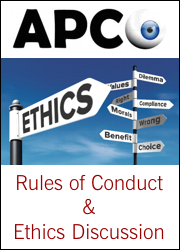Scenario 4: Offering Advice?
You are at a private function, on a Sunday afternoon, with your family, and you are approached by a good friend of yours (who knows you are a Chartered Surveyor). Your friend is seeking some friendly advice about a local property they wish to make a sizeable investment in.
How would you deal with their request?
Discuss the Ethical Issues?
See ALL of the Discussions HERE: https://apceye.wordpress.com/roc-ethical-scenario-discussions/
Have you got a Rules of Conduct / Ethical Scenario that you would like to suggest for future discussion? Email the details to me at: jon@delever.com


The question does not state if the surveyor is employed or has their own practice.
If he’s in practice, I’d advise that the friend makes an appointment with the surveyor after the function (or the next day if alcohol has been consumed in large quantities!)
If the surveyor is employed and has no Professional Indemnity insurance then he should advise his friend to seek the advise of another surveyor with the relevant insurances. This is for the protection of the surveyor and his friend.
Duty of care is owed even if providing pro-bono or friendly advice, therefore if your advice is not given with due care and skill and in consideration of all the factors of the case you could be liable for negligence.
I would advise my good friend that to advise on this it would require agreement of terms of engagement in order to establish the scope of instruction and so he understand what can be relied on from the professional advice given.
This way there is no misunderstanding about the advice and how much weight can be placed on it.
Also, if you’re a professional representing the RICS, in and out of work, how can you give advice when you have not seen the property, you don’t know the full extent or details of the investment. It is not something you would do whilst in work…
A duty of care is owed when giving advice – even if for pro-bono or friendly advice.
To avoid the risk of being sued for negligence ask the friend to agree some terms of engagement so you both understand the scope and extent of the instruction and the advice you will be providing.
The issue around offering advice appears to centre around a friend requesting advice on a house purchase or extension etc.
Has anybody considered the scenario where a family member requests advice of a similar nature. Would you still take the same stance as if it were a friend?
i’m not sure if this would be raised during your final assessment, but all thoughts are welcome!